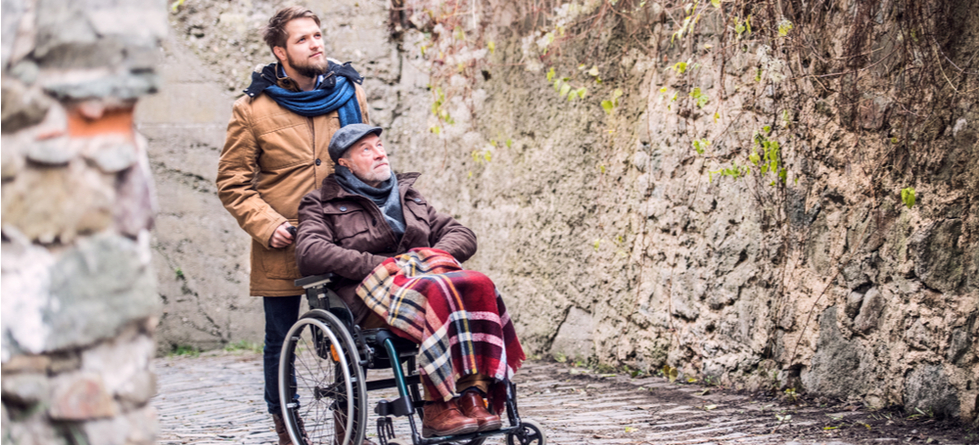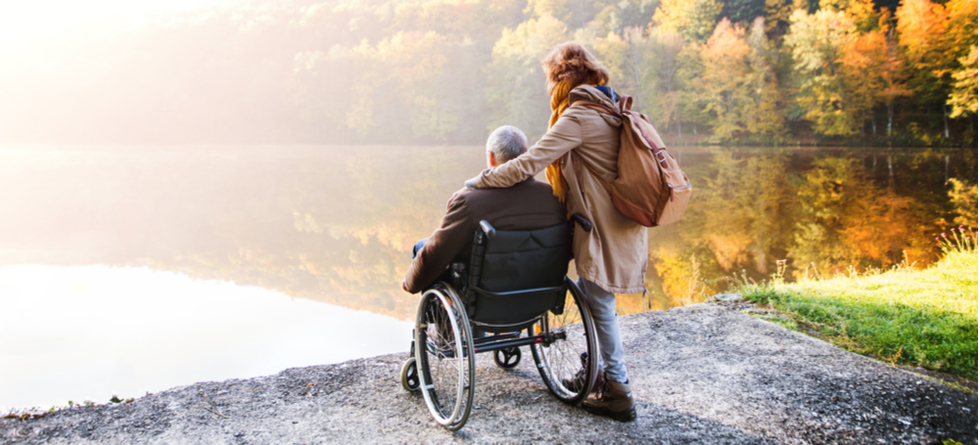How Do You Care for Someone with Spinal Cord Injury?
A spinal cord injury (SCI) is a life-altering event that can have a profound impact on an individual’s physical, emotional, and psychological well-being. Either the injury is the result of an accident, illness, or disease, the recovery and care process require patience, compassion, and specialized knowledge.
For caregivers in Sugar Land, Texas, like those working with Devoted Helpers, understanding the needs of someone with a spinal cord injury is essential for providing effective, compassionate care. In this article, we’ll cover the key aspects of caring for someone with SCI, from medical care and daily tasks to emotional support.
Understanding Spinal Cord Injury (SCI)
The spinal cord is a bundle of nerves that carries messages between the brain and the rest of the body. An injury to the spinal cord disrupts these messages, leading to a range of disabilities, including partial or total loss of sensation and mobility. The severity of the injury depends on where it occurs along the spine and how badly the spinal cord is damaged.
SCI can be classified into two main types
- Complete SCI – This means the spinal cord is fully severed or damaged, resulting in total loss of function below the injury site.
- Incomplete SCI – This means there is some preservation of spinal cord function, and partial movement or sensation may still be present below the injury level.
The level and severity of the injury will impact the care needed.
Immediate Care and Medical Needs
When caring for someone with a spinal cord injury, immediate medical intervention is critical. If the injury is fresh, it is essential to follow proper medical protocols, which may include…
- Stabilizing the spine – Ensuring the person remains immobile until medical help arrives to avoid further damage.
- Monitoring vital signs – This includes heart rate, blood pressure, and breathing, as SCI can affect autonomic functions.
- Medical Treatment – Emergency treatment may include surgical intervention to stabilize the spine, as well as medications to reduce swelling and inflammation.
Once the person has stabilized, long-term care focuses on ongoing monitoring, rehabilitation, and adjusting to new limitations.
Key Aspects of Care for Someone with SCI
Once the immediate medical needs are addressed, the following aspects of care become essential in the daily life of someone with a spinal cord injury.
Mobility and Physical Support
The impact of SCI often includes loss of mobility, which can vary depending on the level of injury. Providing support for mobility and helping them adapt to their environment are crucial steps.
- Wheelchairs – A wheelchair is essential for those who cannot walk. Caregivers should assist with proper seating adjustments, comfort, and use of specialized wheelchair features.
- Assistive Devices – Depending on the type of injury, people with SCI may also use crutches, prosthetics, or other devices to help with limited mobility.
- Rehabilitation – Regular physical therapy is necessary to strengthen remaining muscles and prevent atrophy. It is important to follow the therapist’s recommendations for range-of-motion exercises, stretches, and strengthening exercises.
Daily Activities and Assistance
Since individuals with SCI may face challenges performing activities of daily living (ADLs), caregivers play a crucial role in providing help with tasks such as…
- Bathing and Hygiene – It may be necessary to help with bathing, grooming, and personal hygiene. Individuals with SCI may require assistance to safely transfer in and out of the shower or bath.
- Dressing – Dressing may require specialized clothing or adaptive devices to make the process easier for someone with limited mobility.
- Feeding – Some individuals with SCI may have difficulty feeding themselves. They might need assistance with meal preparation and feeding depending on their condition.
- Toileting – Many individuals with SCI have impaired bladder and bowel control. Caregivers should assist with toileting routines, use of catheterization or bowel programs, and ensure hygiene.
Preventing Pressure Ulcers
Pressure ulcers, also known as bedsores, are a common and serious complication of spinal cord injuries due to immobility. Regular repositioning is crucial to prevent these sores.
- Repositioning – Encourage the person to change positions regularly (every 2 hours if they are in bed) to relieve pressure on areas of the body that are most prone to bedsores, such as the back, hips, and heels.
- Skin Care – Carefully inspect the skin for signs of redness or irritation and keep the skin clean and dry. Specialized mattresses and cushions can reduce the risk of sores.
- Nutrition – Proper nutrition, including adequate protein and vitamin intake, is essential for skin health and wound healing.
Bladder and Bowel Management
Spinal cord injuries often disrupt the body’s ability to control bladder and bowel functions. A well-established routine for bladder and bowel care is necessary, which may include…
- Catheterization – Some individuals with SCI may need intermittent catheterization or a permanent catheter to manage urine.
- Bowel Program – This involves establishing a regular schedule to empty the bowels, which may include medications, dietary changes, or manual techniques.
Working closely with a healthcare provider will help determine the most appropriate bladder and bowel care plan.
Respiratory and Circulatory Support
Injuries at higher levels of the spine (such as the cervical spine) can affect breathing and circulation, which may require…
- Ventilator or Respiratory Support – People with high-level spinal cord injuries may need a ventilator or other respiratory support if they are unable to breathe independently.
- Circulation Assistance – Since SCI can also affect the ability to move limbs, the person may be at risk for deep vein thrombosis (DVT) or poor circulation. Blood thinners, compression stockings, and leg exercises can help reduce the risk.
Emotional and Psychological Support
Living with a spinal cord injury can be mentally and emotionally challenging, particularly as individuals adjust to their new reality. Caregivers should provide emotional support and encourage social interaction, maintaining the person’s dignity and sense of independence. Some things to keep in mind…
- Mental Health Care – Depression, anxiety, and stress are common following SCI, and individuals may benefit from counseling or support groups.
- Encourage Socializing – It is important to keep the person socially connected to family, friends, and activities they enjoyed before the injury. Staying engaged in meaningful activities helps improve overall well-being.
Professional Medical Care and Regular Checkups
Caregivers should ensure the individual receives ongoing medical care, including…
- Regular Checkups – Regular visits to doctors and specialists are necessary to monitor progress, manage complications, and adjust care plans.
- Rehabilitation Programs – Long-term rehabilitation programs, including physical, occupational, and psychological therapy, are vital in promoting independence and improving quality of life.
- Pain Management – Some individuals may experience chronic pain due to SCI. Caregivers should work with healthcare providers to manage pain through medications, physical therapy, or alternative treatments.
Caring for someone with a spinal cord injury requires patience, attention to detail, and a thorough understanding of their physical and emotional needs. At Devoted Helpers, we are committed to providing personalized, compassionate care to individuals with SCI, ensuring they receive the support they need to live a fulfilling life.
If you are caring for someone with a spinal cord injury, or if you are seeking professional assistance for a loved one, Devoted Helpers in Sugar Land, Texas, is here to support you every step of the way. Our team can provide in-home care that focuses on mobility, daily activities, skin care, emotional support, and more.
Feel free to reach out for more information on how we can assist you or your loved one during this challenging time.

